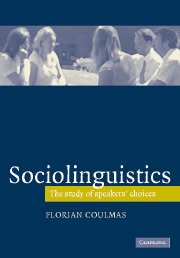Book contents
- Frontmatter
- Contents
- 1 Introduction: notions of language
- Part I Micro-choices
- Part II Macro-choices
- 7 Code-switching: linguistic choices across language boundaries
- 8 Diglossia and bilingualism: functional restrictions on language choice
- 9 Language spread, shift and maintenance: how groups choose their language
- 10 Language and identity: individual, social, national
- 11 Language planning: communication demands, public choice, utility
- 12 Select letters: a major divide
- 13 The language of choice
- Glossary of terms
- References
- Internet resources
- Index
- References
12 - Select letters: a major divide
Published online by Cambridge University Press: 05 June 2012
- Frontmatter
- Contents
- 1 Introduction: notions of language
- Part I Micro-choices
- Part II Macro-choices
- 7 Code-switching: linguistic choices across language boundaries
- 8 Diglossia and bilingualism: functional restrictions on language choice
- 9 Language spread, shift and maintenance: how groups choose their language
- 10 Language and identity: individual, social, national
- 11 Language planning: communication demands, public choice, utility
- 12 Select letters: a major divide
- 13 The language of choice
- Glossary of terms
- References
- Internet resources
- Index
- References
Summary
Put writing in your heart that you may protect yourself from hard labour of any kind.
Egyptian scribe of the New KingdomIn the Eskimo language Inuktitut, as it has come to be written in newspapers, relative clauses are actually developing from the ground up, having not existed at all in the language as it was spoken by hunter-gatherers.
McWhorter (2003: 247)Within the global structure of power differentials, languages have a hierarchy.
Prah (2001: 127)Writing marks a deep divide. In early sociolinguistic work this was very obvious. Basil Bernstein's (1971) distinction between the ‘restricted code’ of working-class speakers and the ‘elaborated code’ of the middle classes mirrored that between spoken vernacular and written language. In largely literate societies, access to written language and the degree of written language skills remain strong indicators of social class, those with no or limited literacy ranging at the bottom of the social hierarchy.
Functional domains of language use are also divided along the oral/literate split, both unwritten languages and illiterate speakers being excluded from the domains of higher communication, such as education, government, and science and technology.
Gender and age, the other social dimensions that have formed the core of sociolinguistic research, likewise correlate with literacy (Stromquist 1999). In Third World countries where illiteracy continues to be a problem, such as India, illiteracy is highest among rural women, as used to be the case in Europe prior to universal education.
- Type
- Chapter
- Information
- SociolinguisticsThe Study of Speakers' Choices, pp. 204 - 219Publisher: Cambridge University PressPrint publication year: 2005

